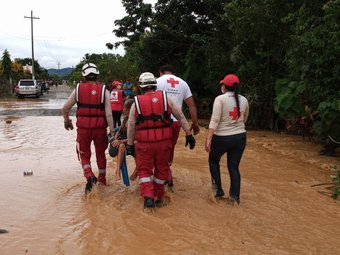Guatemala
Key facts
Hazards covered by anticipation
Drought | Volcanic ash | Tropical storms
Anticipation partners in country
Guatemalan Red Cross | German Red Cross | Red Cross Red Crescent Climate Centre | National Institute for Seismology, Vulcanology, Meteorology and Hydrology (Instituto Nacional de Sismología, Vulcanologia, Meteorologia e Hidrología) | Executive Ministry of the National Coordinator of Disaster Reduction | FAO | Start Network | Care International | Trócaire
Inform Risk Index (2022)
Hazard and exposure: 4.8
Vulnerability: 5.7
Lack of coping capacity: 5.4
Total: 5.3 (high)
Rank: 35
Photo: Maynor Mijangos / Guatemalan Red Cross
Country profile
Guatemala has a tropical climate, with ecological zones ranging from tropical forests to cool highlands, as well as a dry eastern corridor. It is a lower middle-income country, and 59 per cent of the population lives in poverty. It has the highest rate of chronic malnutrition in Latin America and the sixth highest rate in the world.
The country is exposed to drought, flooding, landslides, hurricanes, earthquakes and volcanic eruptions. As a result of the climatological, topographical and socio-economic factors mentioned, these events often have severe impacts on people’s lives and livelihoods, as well as on the country's infrastructure and economic activity. For example:
- The 2015/16 El Niño caused the country’s worst drought in decades, resulting in widespread crop failure and food insecurity, particularly among indigenous communities.
- One third of the population depends on agriculture or other natural resources for their livelihoods. Much of this is practiced on hillsides, increasing the risk of disruptions from landslides and flooding.
- Hurricanes such as Mitch (1998), Stan (2005) and Eta (2020) brought heavy rains and winds that killed hundreds of people, flooded homes and triggered landslides that sweep away entire communities.
- In 2010, the Pacaya volcano erupted, raining ash on Guatemala City. This affected people's health, destroyed crops and contaminated water systems.
Projects
Strengthening FbF readiness and disaster preparedness in Guatemala
Since 2019, the Guatemalan Red Cross has been developing Early Action Protocols for volcanic ash, tropical storms and drought. The project also provides extensive support to the National Society in further developing its preparedness and response system.
In June 2020 the Start Network awarded £415,000 to Care International and Trócaire for anticipatory action before a hurricane (alert 436).
FAO is supporting early action for drought in Guatemala.


